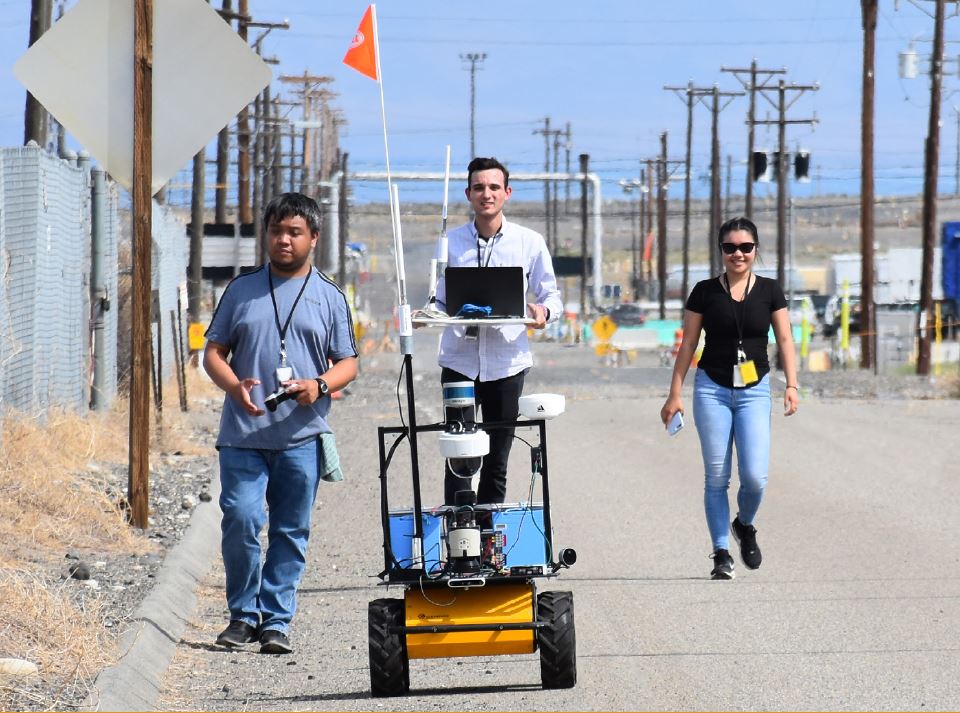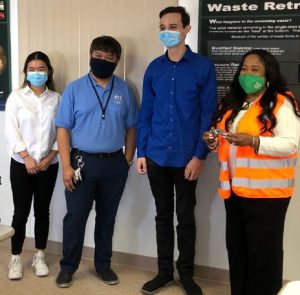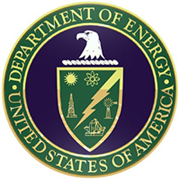A group of students from Florida International University (FIU) will have quite a story to tell when asked to share what they did this summer.
Jeff Natividad is participating in a summer internship with Hanford tank operations contractor Washington River Protection Solutions as part of a unique fellowship program between the Department of Energy Office of Environmental Management (DOE-EM) and FIU.
The Science and Technology Workforce Development Program is designed to develop, train, and mentor a pool of minority scientists and engineers as the next generation of leaders for the DOE.

During a recent road closure, Florida International University students (left to right) Jeff Natividad, Joel Adams and Thi Tran test a radiation mapping robot outside of U Farm
“The tasks we’re given during our time here allow me to apply what I learned in the classroom,” said Natividad, who also took part in the internship program at WRPS last year.
He and fellow FIU students Thi Tran and Joel Adams have spent their time at Hanford programming a robot called The Canary. The robot can travel through suspected contaminated areas to provide three-dimensional maps of radiological readings.
“We worked on refreshing its robot operating system, then added two more on-board computers to support additional sensors, redesigned the power system, and added three cameras,” Natividad said. “We also integrated the GPS and a new network system. It’s been a busy summer.”
Students taking part in the Fellowship focus on one of four major research areas, including tanks and high-level waste; deactivation and decommissioning; soil and groundwater; and artificial intelligence/machine learning and information technology.
“The partnership with the Fellowship program allows us to tap into talent with relative experience and education in the waste management sector,” said Alex Pappas, who serves as a mentor for the students at WRPS. “Our frequent interaction allows us to create mutually beneficial graduate programs and these that build our knowledge depth and prepare the next generation of technical leaders for the Hanford Site.”

(Left to right) Interns Thi Tran, Jeff Natividad, and Joel Adams met with Nicole Nelson-Jean, DOE Associate Principal Deputy Assistant Secretary for the Office of Environmental Management (right) when she visited the Hanford Site in June
Since 2007, more than 190 FIU students have participated in the Fellowship program, many of them are the first generation in their family to attend college.
“This give them the opportunity to participate in research that a lot of undergrads don’t get the chance to do, and the program also provides an opportunity for Masters and Ph.D. students to develop their theses and dissertation research respectively,” said Dr. Leonel Lagos, principal investigator for the DOE/FIU cooperative agreement and director of research at FIU’s Applied Research Center. “They come out of the program better-prepared, and with a better understanding of the industry.”
Lagos said most of the undergraduates and graduate students (masters, and Ph.Ds) have job offers waiting for them when they complete the program, and many begin careers with the DOE, its contractors, or private STEM-related industry.
“We appreciate the support of DOE and the Office of Environmental Management,” Lagos added. “These students have a competitive edge because of the connection they make with the scientists and engineers in the field, and we couldn’t run this program without the support of the DOE and contractors like WRPS.”
This article was published under the Solutions Magazine – A weekly publication of highlights and progress of the Hanford Tank Operations Contractor, Washington River Protection Solutions, Issue 584, Aug. 10, 2021
Solutions Publication – Issue 584
Solutions_Publication – DOE Fellows Students article
